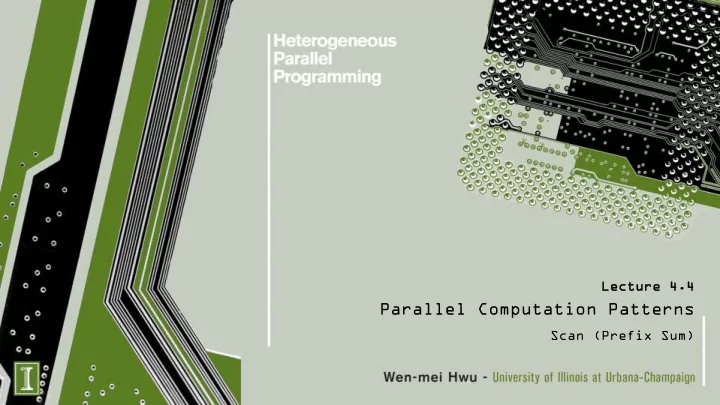

Lecture Lecture 4.4 4.4 Parallel Computation Patterns Scan (Prefix Sum)
Objective • To master parallel scan (prefix sum) algorithms • frequently used for parallel work assignment and resource allocation • A key primitive in many parallel algorithms to convert serial computation into parallel computation • A foundational parallel computation pattern • Work efficiency of kernels • Reading – Mark Harris, Parallel Prefix Sum with CUDA • http://developer.download.nvidia.co m/compute/cuda/1_1/Website/projects /scan/doc/scan.pdf 2
(Inclusive) Prefix-Sum (Scan) Definition Definition: The all-prefix-sums operation takes a binary associative operator ⊕ , and an array of n elements [ x 0 , x 1 , …, x n-1 ], and returns the array [ x 0 , ( x 0 ⊕ x 1 ), …, ( x 0 ⊕ x 1 ⊕ … ⊕ x n-1 )]. Example: If ⊕ is addition, then the all-prefix-sums operation on the array [3 1 7 0 4 1 6 3], would return [3 4 11 11 15 16 22 25]. 3
An Inclusive Scan Application Example • Assume that we have a 100-inch sausage to feed 10 • We know how much each person wants in inches • [3 5 2 7 28 4 3 0 8 1] • How do we cut the sausage quickly? • How much will be left • Method 1: cut the sections sequentially: 3 inches first, 5 inches second, 2 inches third, etc. • Method 2: calculate prefix sum: • [3, 8, 10, 17, 45, 49, 52, 52, 60, 61] (39 inches left) 4
Typical Applications of Scan • Scan is a simple and useful parallel building block • Convert recurrences from sequential : for(j=1;j<n;j++) out[j] = out[j-1] + f(j); • into parallel: forall(j) { temp[j] = f(j) }; scan(out, temp); • Useful for many parallel algorithms: • • Radix sort Polynomial evaluation • • Quicksort Solving recurrences • • String comparison Tree operations • • Histograms, …. Lexical analysis • Stream compaction 5
Other Applications • Assigning camp slots • Assigning farmer market space • Allocating memory to parallel threads • Allocating memory buffer for communication channels • … 6
An Inclusive Sequential Addition Scan Given a sequence [ x 0 , x 1 , x 2 , ... ] Calculate output [ y 0 , y 1 , y 2 , ... ] Such that y 0 = x 0 y 1 = x 0 + x 1 y 2 = x 0 + x 1 + x 2 … Using a recursive definition y i = y i − 1 + x i 7
A Work Efficient C Implementation y[0] = x[0]; for (i = 1; i < Max_i; i++) y[i] = y [i-1] + x[i]; Computationally efficient: N additions needed for N elements - O(N)! Only slightly more expensive than sequential reduction. 8
A Naïve Inclusive Parallel Scan • Assign one thread to calculate each y element • Have every thread to add up all x elements needed for the y element y 0 = x 0 y 1 = x 0 + x 1 y 2 = x 0 + x 1 + x 2 “Parallel programming is easy as long as you do not care about performance.” 9
To learn more, read Section 9.1-9.2
Recommend
More recommend